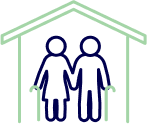PER THE CDC, Adults at a higher risk for severe RSV include 2,6 :

OLDER ADULTS2

THOSE LIVING IN NURSING HOMES
OR LONG-TERM CARE FACILITIES2

THOSE WITH AN IMMUNODEFICIENCY OR
CHRONIC HEART OR LUNG DISEASE2

THOSE WITH DIABETES OR CERTAIN
OTHER UNDERLYING CONDITIONS2,6
MMWR=Morbidity and Mortality Weekly Report.
See full list of underlying conditions in the MMWR.
